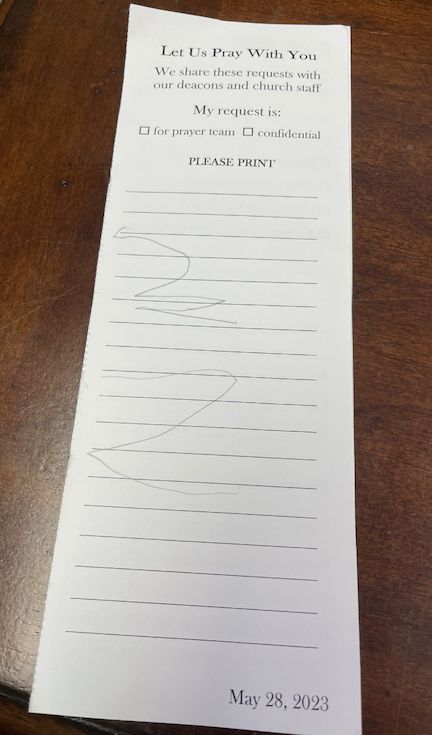Churches Offer A Money Back Guarantee
Greg Garrison, with AL.COM, writes:
Many churches are picking up on a trend of getting people to donate to the church by offering a money-back guarantee if God does not bless them, according to Christianity Today.
NewSpring Church in South Carolina is one of hundreds of congregations across the country that have offered 90-day tithing challenges, the magazine reported.
. . . "Participants sign up with a commitment to give 10 percent of their income or more, and if 'God doesn't hold true to his promises of blessings' after three months, they can request their money back—no questions asked. It's the church's version of 'satisfaction guaranteed,'" CT said.
The idea is backed up by a Bible verse in the Old Testament Book of Malachi:
"Bring the whole tithe into the storehouse, that there may be food in my house. Test me in this," says the Lord Almighty, "and see if I will not throw open the floodgates of heaven and pour out so much blessing that there will not be room enough to store it." (Malachi 3:11, NIV).
"God literally says, 'Test me out, see if I'm God,'" NewSpring Pastor Perry Noble said in a sermon. "You and I cannot out-give him."
Try to imagine the “Oh, ye of little faith” looks received by those with the nerve to ask for their money back! After all, aren't they impugning God’s reputation, suggesting He hasn't fulfilled his part of the bargain? But that's where the problem lies, theologically speaking. These churches are appealing to a conditional promise made to the adherents of Judaism, under the Old Covenant .
The Book of Hebrews tells us that The New Testament, or New Covenant, is a better agreement than The Old Covenant, being based on better promises. The New Covenant is based on unconditional promises, on heavenly promises, as opposed to conditional, earthly ones. The New Covenant is not only better, it also happens to be the one currently in effect in this, the Church Age.
This means that conditional promise like this one found in Malachi, have been replaced by the New Covenant. The New Covenant does not demand a tithe (the concept never appears in the Epistles where The New Covenant is explained) nor does it threaten a curse on those who fail to offer one, not does it promise blessings based on the giving of said tithe. Those who push this conditional promise cherry pick from the Old Covenant, ignoring many other laws and regulations laid out under the contract between God and the nation of Israel.
Under the New Covenant the blessing is found in the giving itself, as Jesus promised when He said, "It is more blessed to give than to receive" (Acts 20:35). That's because at the heart of The New Covenant is a New Command; "Love one another. As I have loved you" (John 13:34). The love of Jesus doesn't worry about whether there will be earthly gains that come for its efforts. Agape love, being selflessly motivated, doesn’t ask for a money back guarantee. It just loves.
"But in fact the ministry Jesus has received is as superior to theirs as the covenant of which he is mediator is superior to the old one, since the new covenant is established on better promises" (Hebrews 8:6).
Scribbled Prayers
One of the great privileges of serving as a deacon is the opportunity to be one of the first to pray over needs shared at the beginning of the worship service. Our congregation is invited to fill out prayer request cards which are available in each pew. They simply say, "Let us pray with you," leaving a blank space, with the prompt, "My request is ..."
A particular prayer request stood out to me. It was the scribblings of a young child filling out the blank prayer card as he sat in the pew. Just a squiggly line — up, down, and back and forth on the card.

I love the heart of a child eager to participate and share their scribbles for prayer. “Let the little children come to me, and don’t stop them, because the kingdom of God belongs to such as these” (Luke 18:16, NIV).
It also reminded me that this is how a lot of my prayers must sound before the sovereign God. My praying must often be not much more than scribbles of unintelligible ideas and whinings when presented to Him. But I am glad that he knows them better than I do.
“Likewise the Spirit helps us in our weakness. For we do not know what to pray for as we ought, but the Spirit himself intercedes for us with groanings too deep for words” (Romans 8:26, ESV).
Thank God For Spiritual Spring!
Bound in each blossom and the green of the lawn
Is a message for the whole world to see
Witnessed by each person who beholds the dawn
Or every bush, plant, and flower, each tree
The deer, the rabbits, the birds of the morning
So many testify of its coming
As God brings new life, His gracious performing
Is heard in their songs, sounds, and humming
Nature displays in graphic depiction
How God brings life after death
Look up at His Son and His cruel crucifixion
As He yielded and breathed His last breath
The cold of the tomb could only envelope
God in the flesh for so long
The faithful writers with words develop
How a dirge became a victory song
“He is not here! He is risen!”
The angels their chorus related
His grave was a powerless prison
His disciples would soon be elated!
The good news spread like a blanket of flowers
In the field of men’s hearts full of trust
It still bursts forth in fruitful bowers
That new life can spring up from the dust
Dear friend, you may be in the winter of despair
The icy grip of sin bringing guilt and strife
Believe that the Son can make your skies fair
Defeat death and bringing you new life!

"The Lord’s lovingkindnesses indeed never cease, For His compassions never fail. They are new every morning; Great is Your faithfulness. 'The Lord is my portion,' says my soul, 'Therefore I have hope in Him'" (Lamentations 3:22-24, NASB).